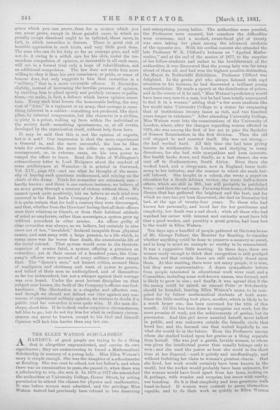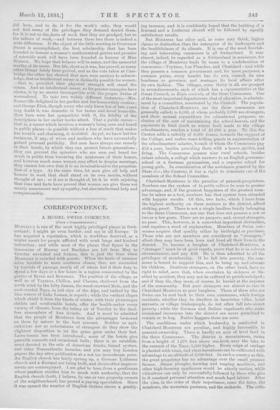THE ELLEN WATSON SCHOLARSHIP.
AHANDFUL of good people are trying to do a thing that is altogether unprecedented, and carries its own significance ; they are endeavouring to found a Mathematical Scholarship in memory of a young lady. Miss Ellen Watson's story is simple enough. She was the daughter of a schoolmaster at Reading. She was sent to school, not her father's, and when there was an examination to pass, she passed it, when tbere was
scholarship to win, she won it In 1876 or 1877 she astonished the authorities at University College, Gower Street, by asking permission to attend the classes for physics and mathematics. It was before women were admitted, and the privilege Miss Watson desired. had previously been refused to two deserving and enterprising young ladies. The authorities were puzzled, the Professors were amused, but somehow the difficulties were overcome, and. a modest, sweet-faced girl of twenty was seen taking her place among the advanced students of the opposite sex. With his cordial consent she attended the late Professor W. X; Clifford's lectures on "Applied Mathe- matics," and at the end of the session of 1877, to the surprise of her fellow-students and rather to the bewilderment of the authorities, it was discovered that the young lady was far away ahead of them all, and had won the highest possible distinction, the Meyer de Rothschild Exhibition. Professor Clifford was delighted. In the gentle girl who always listened with rapt attention to his lectures, he had discovered a brilliant young mathematician. He made a speech at the distribution of prizes, and in the course of it he said," Miss Watson's proficiency would. have been very rare in,a man, but he had been totally unprepared to find it in a woman," adding that "a few more students like her would raise University College to a status far surpassing that of institutions twenty times as rich, and two hundred. years longer in existence." After attending University College, Miss Watson went into the examinations of the University of London, where, after the changes regarding women effected in 1878, she was among the first of her sex to pass the Bachelor of Science Examination in the first division. Then the old evil stepped in and asserted itself. She was not strong,— she bad worked hard. All this time she had been giving lessons in mathematics in London, and studying in many directions, for she had wide sympathies and keen interests. Her health broke down, and finally, as a last chance, she was sent off to Grahamstown, South Africa. Even there she worked hard, and a clergyman, now in England, bears testi- mony to her industry, and the manner in which she made her- self beloved. She taught in a school, she wrote a paper on education for a South-African review, she wrote half-a-dozen others, which are still in MS., but will probably be published.
here,—and then the end came. Far away from home, of the direful disease that has gathered the brightest and the best, and for which no cure has yet been discovered, she died on December 3rd.
last, at the age of twenty-four years. To those who had.
known her personally, and loved her for her gentleness and simplicity, her death was a sad shock ; while all those who had watched her career with interest and curiosity must have felt that a good worker, and possibly a great genius, had been lost to the world in Ellen Watson.
Ten days ago, a handful of people gathered at the town house of Mr. George Palmer, the Member for Reading, to consider whether anything could be done to preserve a memory so sweet, and to keep in mind an example so worthy to be remembered. It was a suggestive little meeting. In these days, there are women ready enough to think that recognition is still grudged to them, and that certain doors are still unfairly closed upon them. At this meeting, there were not many people, it is true, but they were representative. A dozen sympathetic letters from people interested in educational work were read, and a Committee, including some well-known names, was formed, and is likely to grow in size ; and finally, it was agreed that if the the money could be raised, an annual Prize or Scholarship should be founded, bearing Ellen Watson's name, to be com- peted for by future mathematical students of both sexes.
Since the little meeting took place, another, which is likely to be a much larger one, has been convened for the 16th of this month. All this has been done to recognise not work, but the mere promise of work, not the achievements of genius, but its possession. And this girl never asserted herself, never talked in public, and was unknown outside the friendly circle that loved her, and the learned one that waited hopefully to see what she would do in the future. Even the Professors among whom she studied. looked upon her genius as a thing separate from herself. She was just a gentle, lovable woman, to whom. was given the intellectual power that usually belongs only to men ; and she used the power as best she could in the short time at her disposal,—used it quietly and unoffendingly, and without forfeiting her claim to woman's greatest charm. Had she lived, her work would certainly have been known to the world; but the worker would probably have been unknown, for
the woman would. have lived apart from her fame, looking. on
it, perhaps, with wonder and surprise, but never with vanity, nor boasting. So it is that simplicity and true greatness walk hand-in-hand. If women were content to prove themselves capable, and to do their work as quietly as Ellen Watsou did hers, and to do it for the work's sake, they would .not find many of the privileges they demand denied them, for it is not to the doers of woik that they are grudged, but to the talkers of work,—and between these two there is indeed a wide difference. If the object of the little meeting in Grosvenor *Street is accomplished, the first scholarship that has been founded to honour a, womfin's mathematical genius and promise of scientific work will have been founded in honour of Miss Watson. We hope that helpers will be many, nod the memorial worthy of its name. Her life, short as it was, has proved, as many other things lately have proved, and as the vote taken at Cam- bridge the other day showed that men were anxious to acknow- ledge, that an intellectual career is distinctly possible for women, —that is, provided their physical strength will stand the strain. And. an intellectual career, as far greater examples have .shown, is by no means incompatible with the proper duties of womanhood. To take two widely different instances,—Mrs. Somerville delighted in her garden and her housewifely routine; and George Eliot, though many who only knew her of late years may doubt it, was domestic in her tastes and loved home-life. How keen were her sympathies with it, the fidelity of the .descriptions in her earlier works attest. That a public career— that is, a career which involves a woman's being seen and heard in public places—is possible without a loss of much that makes her lovable and charming, is doubtful. As yet, we know but few instances, if any, of wives and mothers who have successfully .gained personal publicity. But men have always one remedy in their hands, by which they can protect future generations ; they can prevent the spinsters who are seen and heard too much in public from becoming the mistresses of their homes, .and however much some women may affect to despise marriage, they cannot but own that it is an invaluable aid to the perpetua- tion of a type. At the same time, let men give all help and
-honour to work that shall stand on its own merits, without thought of sex ; or if sex is thought of, let it be with rejoicing that time and facts have proved that women can give them not merely amusement and sympathy, but also intellectual help aud ccom pauiouship.



































 Previous page
Previous page